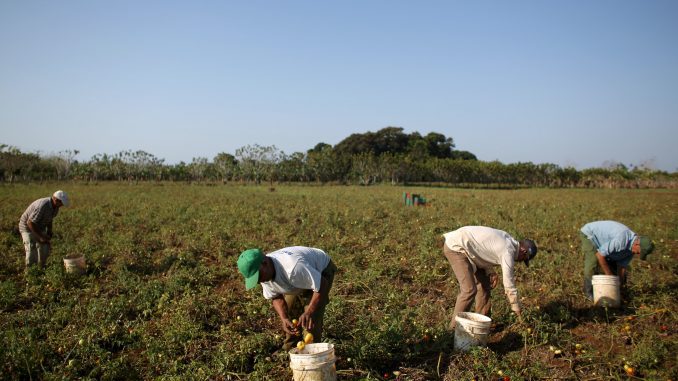
RALEIGH — A bill to scrap the present guest worker visa process for agricultural workers was introduced in the U.S. Congress in late July, co-sponsored by two N.C. Republicans, Mark Meadows (N.C.-11) and Mark Walker (N.C.-6). The bill would swap the tighter restrictions of the H-2A certification and the paper-based I-9 worker verification system with a new system called H-2C that would employ the digital E-Verify system and would allow freer movement for guest workers.
“H.R. 6417 addresses H-2A visas by bringing more opportunities for our farmers to hire employees,” Walker’s communications director, Jack Minor, told the North State Journal. “The legislation reduces regulatory and bureaucratic requirements, allowing for more efficiency and helping our farmers with higher profit margins. The legislation also implements national E-Verify, a legislative priority for Congressman Walker.”
Use of the H-2A guest worker program, which solely certifies agricultural employment, has tripled in the past decade, and North Carolina’s farm-heavy economy often appears near the top in states using the system. The Center for Immigration Studies, a think tank focused on reducing migration, issued a press release last week outlining the growth of the program.
Their data, gleaned from the Department of Labor, found around 56 percent of H-2A workers were occupied in five U.S. states — North Carolina, Washington, Florida, Georgia and California. North Carolina topped the list with about 33,000 followed by Washington with 29,000 workers.
While the program, initially intended to reduce the necessity for illegal agricultural workers, has grown, critics say it hasn’t reduced the number of undocumented laborers on the nation’s farms. In fact, the Center for Immigration Studies cites a study by the National Agricultural Worker Survey that found, despite this rapid growth in agricultural guest workers, the majority of farm labor is now done by those unauthorized to work in the country.
“If we’re going to continue to grow fresh fruits and vegetables in this country, we’ve either got to have an oversupply of undocumented workers or a workable guest program,” said Lee Wicker of N.C. Growers Association, the largest company supplying state farmers with workers, including guest workers.
Wicker said that in 2017 they advertised 11,947 jobs in newspapers and employment services trying to hire American farm workers, but they didn’t even receive 100 applications. Of these, only 48 were eventually hired, and of those 48, two finished the season. Wicker believes this shows the dire need for a reliable supply of workers from outside the country. For each of these agricultural “jobs that Americans won’t do,” he says there are about 2.5 jobs reliant on them in support industries, like transportation, machinery repair, corrugated box manufacturing and equipment supply.
After years of debate between advocates of border security, immigrant rights groups and the agricultural industry, H.R. 6417 may be a workable bipartisan compromise. On July 18 of this year, H.R. 6417 was introduced by members of the House Judiciary Committee. The bill, dubbed the Ag and Legal Workforce Act, also allows a gradual phase-in for employers so they do not have to choose between heavy penalties and replacing much of their workforce overnight.
Lynda Loveland of the N.C. Farm Bureau, an industry organization, told the North State Journal this bill is vital and urgent.
“We are at a critical level of need for reliable, skilled labor on North Carolina farms,” said Loveland. “Our farmers can’t afford to be without it. The immigration system is broken, and it needs to be fixed. The North Carolina Farm Bureau has been seeking immigration legislation for more than 20 years. H.R. 6417 addresses many of the farming community’s concerns. It is a great deal better than the status quo for farmers and farm workers. It also brings more certainty to the community. If this bill fails it may be years before we get immigration reform. Farmers are hurting. Families are hurting. We need this legislation now.”
Minor agreed, saying, “These policies will help our agriculture community flourish and support the rule of law, strengthening our immigration enforcement. Agriculture is the top industry in North Carolina, making up 18 percent of our state’s income and more than 17 percent of our workforce. The more certainty we can provide to our farmers and rural communities, the better our state can thrive.”



